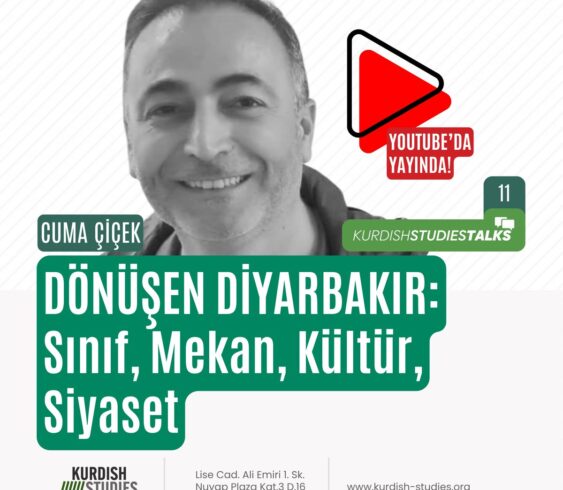Kurdish Barometer

Mesut Yeğen
The report of the first wave of the Kurdish Barometer — an initiative planned by the Kurdish Studies Center, based in Diyarbakır and of which I am a member, to be carried out regularly and over the long term, including Kurds in Iraq, Syria, and the diaspora — has now been published. The report, based on fieldwork conducted at the end of 2022 but only made public last week due to the political focus on elections and the earthquake, contains important findings about Kurds in Türkiye. Some of the findings highlighted by Vahap Coşkun in his Perspective article last week indicate that, within the context of the Kurdish issue, the foundational factors, its key drivers, and defining motifs will remain stable, be reinforced, or evolve over the medium to long term. Let me share some of the findings that I personally consider important.
Demographics
The first finding relates to demographics. The Kurdish Barometer indicates that Kurds in Türkiye are now more urbanized, better educated, and more settled than in the past. A large portion of Kurds now live in urban centers, education levels have been rising rapidly among recent generations, and an increasing number reside in the cities where they were born. It is, of course, impossible to predict with certainty how Kurdish identity and the Kurdish issue will evolve in the long term. However, since it seems certain that both will continue to be present here for quite some time, this demographic data allows us to draw the following initial conclusion: the bearers of Kurdish identity and the Kurdish issue are becoming increasingly urban, better educated, and more settled Kurds, and the places where the Kurdish issue unfolds and evolves will increasingly be cities—Kurdish cities. In this context, it is not difficult to anticipate that Kurdish identity, as expressed through the Kurdish language, will gradually weaken, or that a form of Kurdish identity with a weakened connection to the Kurdish language will expand. Since life in Kurdish cities is increasingly becoming more Turkified, we can infer that this demographic transformation will weaken Kurdish identity as expressed through the Kurdish language, or expand a form of Kurdish identity with a diminished connection to the language. Indeed, both the Kurdish Barometer and previous research by the Kurdish Studies Center show that Kurdish remains strongly alive, but there are significant losses in its transmission to new generations. Approximately 40% of Kurds either do not speak Kurdish at all or speak it only minimally.
It is very difficult to predict the long-term impact of demographic changes on the trajectory of the Kurdish issue, as the issue is fueled not only by demographics but also by political, cultural, historical, diplomatic, military, and psychological factors. Nevertheless, in the short term, demographic transformation is likely to influence political behavior as a significant component of the Kurdish issue.
One of the short-term consequences of a more urbanized and better-educated population composition—especially the increasing proportion of educated young people—seems to be the strengthening of the ‘autonomization’ tendency, traces of which are still visible today. Indeed, the Barometer shows that the tendency of Kurdish voters to concentrate in two parties—the Kurdish party and the AK Party—between 2007 and 2018 has weakened, starting from the educated youth, with both party preferences and political-ideological orientations diversifying in these groups. On the other hand, it is difficult to predict today whether this autonomization trend will foster a decreasing engagement with politics, in line with general global and Turkish trends, or whether it will lead to new forms of engagement that open the way for new proposals in defining the Kurdish issue. The state’s persistent domination and insistence on denying Kurdish identity, along with the long-standing legitimacy of the current definition of the Kurdish issue, currently weaken the possibility of ‘new proposals.’
However, the aspect of demographic transformation that is more likely to affect political behavior and the redefinition of the Kurdish issue relates to “settledness.” According to the Kurdish Barometer, only 18 percent of Kurds do not live in the city where they were born. This indicates a decline in the role of migration to other cities—whether due to economic reasons or conflict—as a rupture or ‘trauma’ in the lives of Kurds. In the TÜBİTAK study conducted with Ulaş Tol and Mehmet Ali Çalışkan, which was later published as Kürtler Ne İstiyor? (What Do the Kurds Want?) (İletişim, 2016), nearly half of Kurds reported being affected by conflicts, whereas the Kurdish Barometer shows that this figure has dropped to around 30 percent. A generation that has not been exposed to the conflict process has been added to the Kurdish population, and the fact that the conflict period is behind them or ‘forgotten’ is also likely to influence political behavior and encourage renewal in the definition of the Kurdish issue. The TÜBİTAK study I mentioned found a strong correlation between being affected by conflict and political behavior, showing that about 70 percent of those affected tended to vote for the HDP. It is not possible to know definitively how the decrease in the proportion of Kurds affected by conflict and the ‘passing’ or ‘forgetting’ of the conflict will affect political behavior, but it is likely to strengthen the tendency towards ‘autonomization.’
The consolidation of settledness may affect not only political behavior but also the framing of the Kurdish issue. One consequence of this is that it may solidify a way of life in which Kurds live among Kurds in the same place, meaning that reduced demographic mobility could lead Kurds to remain more deeply and intensively within the realm of Kurdishness. In other words, while other dynamics of life may weaken Kurdish identity through the Kurdish language, decreased mobility among Kurds could strengthen Kurdishness as being Kurdish among Kurds. This, in turn, could further reinforce the existing connection between the Kurdish issue and the continuity of Kurdish identity.
If the reduction in mobility is due to concerns about discrimination in potential destinations or because the opportunities in those places are no longer what they used to be, decreased mobility among Kurds may both encourage a retreat into Kurdishness and strengthen the link between the Kurdish issue and ‘deprivation.’
Identity and Demands
The Kurdish identity ownership index, constructed by the Barometer using variables such as ‘pride in being Kurdish,’ ‘self-identification as Kurdish,’ and ‘attitudes towards education in the mother tongue,’ indicates that two-thirds of Kurds strongly embrace their Kurdish identity. Clearly, despite the criminalization of Kurdish identity and the persistent politics of domination since 2015, the vast majority of Kurds are not willing to relinquish their identity. The implication is clear: although the criminalization and domination politics reinstated in 2015 ended the Kurdish party’s role as a game-changer, the fundamental ground of identity and belonging that underpins the Kurdish issue remains unchanged. In summary, the Barometer shows that Kurds do not abandon their Kurdishness, despite distancing themselves from the Kurdish language.
Support for the demand for Kurdish-language education also confirms this situation. The TÜBİTAK study I mentioned earlier showed that in 2015, around 80 percent of Kurds wanted Kurdish to be either the language of instruction or taught in schools. The Barometer indicates that there has been no significant change in this regard. Despite the post-2015 politics, which minimized the Kurdish party’s influence on Turkish politics, it appears that Kurds’ tendency to embrace their Kurdishness has not diminished. According to the Barometer, even today, approximately 80 percent of Kurds support Kurdish being the language of instruction or being taught in schools. Nearly half of Kurds (44 percent) demand bilingual education, while about 30 percent want Kurdish to be taught in schools, and 10 percent desire education to be conducted entirely in Kurdish. The strong embrace of Kurdish identity by Kurds means the following: despite the weakening influence of the Kurdish party in Turkish politics, the Kurdish issue—the lifeblood of this politics, or more precisely, the core of the Kurdish issue—the desire for recognition of Kurdishness remains as strong as ever.
There is also an important ‘detail’ regarding Kurds’ embrace of their Kurdishness. The Barometer shows that the relationship between conservatism and maintaining Kurdish identity has transformed. While Kurdishness and the Kurdish language were historically strong in areas and communities influenced by tribes and religious institutions, and tended to weaken in places exposed to modernity and secularism, the findings indicate that the link between traditionalism and conservatism and sustaining Kurdish identity is no longer as strong as it used to be. Strong identification with Kurdish identity is observed in 85 percent of HDP voters, whereas among AK Party voters this rate is 48.9 percent. Similarly, the weakest sense of Kurdish identity is found among Kurds who identify as conservatives or right-wing, alongside Atatürkists.
Political Preferences
There is a significant difference between the current snapshot of political preferences and the picture that emerges over time. The Kurdish Barometer shows that the majority of Kurds’ political preferences are divided between two parties, with most supporting the Kurdish party and a considerable portion continuing to back the AK Party. However, the Barometer also points to another phenomenon confirmed by the 2023 election results: a gradual decline in support for these two parties, accompanied by a tendency to seek alternative political affiliations, both in terms of party preference and political identity. The Barometer indicates that a new group is emerging among Kurds who support the Kurdish party and the AK Party, consisting of voters who cast their ballots for the CHP, protesters, and those who identify as Atatürkists or liberals.
Another important finding regarding political preferences relates to Kurds’ engagement with politics. It appears that the tendency to closely follow daily politics has also decreased among Kurds. Apathy, indifference, and belief in the possibility of change through politics are weakening within the Kurdish population as well. This is evident.
Another important finding in the realm of political preferences concerns Selahattin Demirtaş. The Barometer’s findings show that Demirtaş continues to hold a special place among Kurds. Responses to the question of the most admired political leader indicate that Demirtaş is by far more popular than all other political leaders, both Kurdish and non-Kurdish.
Discrimination
While the Barometer indicates changes in demographics and political preferences, it also points to continuity and persistence in terms of discrimination, just as in the assertion of Kurdish identity. The findings show that the vast majority of Kurds experience discrimination, do not feel equal to “others” or a sense of belonging to the country, and are pessimistic about the future. According to the Barometer, 6 out of every 10 Kurds believe they face discrimination because they are Kurdish. Moreover, there is a significant difference in the perception of discrimination between those who strongly embrace their Kurdish identity and those with a weaker Kurdish identity. %75 of the former group believe they experience discrimination, compared to %29 of the latter. Whether this difference stems from a perceptual gap related to the strength of Kurdish identity or because those with a stronger identity actually face discrimination more frequently is a question that requires further investigation.
The proportion of Kurds who do not feel a sense of belonging to the country is also very high. Four out of every 10 Kurds do not feel they belong to the country. Nearly half of Kurds—48%—believe that Kurds are not treated equally compared to “others” in the eyes of the state. A significant portion—43%—also consider Türkiye to be an unlivable place for Kurds. On the other hand, the majority of Kurds identify themselves as Turkish citizens. The proportion of those who do not see themselves as Turkish citizens is 26%. Of course, more detailed and qualitative studies are needed for a better analysis, but this situation likely points to a gap between Kurds’ feelings of belonging “here” and their desire to stay in the region
Leaving aside the findings on popular culture, values, and similar topics, the Kurdish Barometer—as I mentioned at the outset—indicates that while some things are changing among Kurds, others remain the same. It is clear that demographics and political preferences are shifting and diversifying. However, there has been no significant change in the sense of belonging to Kurdishness, in loyalty to demands related to Kurdish identity, or in the perception or reality of inequality and discrimination. In other words, the Barometer suggests that while the demographics and political landscape surrounding the Kurdish issue are evolving, the Kurdish issue itself remains unchanged. Despite the post-2015 politics of criminalization and domination, and despite Kurds becoming a more urban and better-educated population, the Kurdish issue persists in its full weight. This is what the Barometer points to: even as demographics and preferences shift—albeit to varying degrees—the Kurdish issue, and Kurds’ sense of belonging to Kurdishness as the root of that issue, continues unabated.
As for the question of how this situation might affect the course of the Kurdish issue—more specifically, how it might affect the ways the Kurdish issue is represented and Kurdish politics itself—the answer appears to be that, despite the changes, there is little likelihood of a major shift in the way the Kurdish issue has been represented since the 1990s, or in who represents it, at least in the near future. The slow pace of demographic change and its limited capacity to bring about a profound transformation on its own; the uninterrupted continuation of politics based on criminalization and domination; and the fact that the current representatives of the Kurdish issue still enjoy strong legitimacy while alternative actors lack such legitimacy—all suggest that expecting a major or sudden shift in how the Kurdish issue is represented would be unrealistic. What might happen, perhaps, is this: the Kurdish movement or Kurdish party—currently the main representative of the Kurdish issue—may choose to acknowledge the changes visible in demographics and political preferences, and accordingly update its modes of representation. But even this seems unlikely. The stronger possibility is this: the Kurdish party will lack the capacity and opportunity to undertake such an update, and will continue merely observing the diversification in political preferences, remaining indifferent to it.
(Perspektif Online, November 3, 2023)

